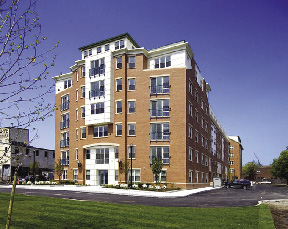ICON Architecture's Maverick Landing is the winner of the 2009 I. Donald Terner Prize, which recognizes successful and innovative affordable housing projects and their leadership teams.
In 1996, visionary leader in the affordable housing field Don Terner tragically lost his life during a humanitarian mission to Bosnia. This biennale prize was created to commemorate his legacy and inspire projects that best exemplify his spirit and commitment to affordable housing.
The winning project, built by ICON Architecture, is a multi-block development on the East Boston's waterfront implementing midrise to lowrise structures to accommodate various living arrangements — from elderly apartments to market-rate townhouses. A transit-oriented development, Maverick Landing, which is one of Mass.'s first green, affordable multi-family housing development, adhering to "healthy homes" principles and achieving LEED certification, is a model for projects funded through the Federal Housing and Urban Development HOPE VI program. The project restores historic street patterns and reconnects residents with the surrounding community. The site offers public open spaces including a park at one corner of the development, a crescent shape of townhouses that invites the public waterfront park into the development and broad walkways that link a community center with housing on all sides.
"We now live in the decent, quality housing we've deserved for a long time," said Ruth Capone, president of the Maverick Tenant Organization.
"The Terner Prize showcases the leadership required to overcome the many obstacles to building affordable housing," said Doug Abbey, prize chair and founder of IHP Capital Partners. "Quality, quantity and affordability, was Don's mantra and the prize is designed to recognize innovation in design, construction, financing, impact on residents' lives and building thriving communities."
The winner was chosen from 53 applications from over 21 states.
The winner and finalists were honored during the 2009 Housing Policy Forum at the Haas School of Business, University of California, Berkeley. The Forum featured panels on housing affordability, standards and mixedincome development and other housing policy issues.
The Forum is sponsored by the BRIDGE Housing Corp., UC Berkeley's Fisher Center for Real Estate & Urban Economics and the Urban Land Institute.
The five finalists are:
Civic-Morrison Redevelopment Housing Authority of Portland, Portland, Ore.: Incorporating the philosophy of "Common Ground" and the values of "Particularity of Place," the Civic-Morrison project features a mixed of housing from the crisp, sleek units well fitted to the young urban professionals to the safe, welcoming environment even for low-income residents. The project is also a model of sustainable design and construction and garners a gold LEED rating.
Renaissance at Civic Center Apartments, Colorado Coalition for the Homeless, Denver, Co.: The development is a mixed-use property that improves a YMCA fitness facility and creates 108 apartments for chronically homeless individuals and includes an on-site clubhouse and other amenities for residents and three supportive service teams for residents and the community.
St. Vincent's Gardens, Mercy Housing California, Santa Barbara, Calif.: St. Vincent's Gardens, Mercy Housing development uses mission revival architectural style, complete with arched openings and vents to create a neighborhood feel. Complete with a community building and plaza, the project include the restoration of a neglected creek and construction of new sidewalks, bike lanes and bus shelter that is useful for the broader community.
Nuevo Amanecer Apartments, South County Housing Corporation, Pajaro, Calif.: The development is designed to maintain the sense of community and interaction among the residents, including patios and balconies, a long central paseo with benches anchored by a large community room on one end and a tot-lot with barbecue and picnic area on the other end. The development that consists of six buildings, with some units designated farmworker households, some who receive rental assistance.
East Biloxi Homes Program, Gulf Coast Community Design Studio: The East Biloxi Homes Program rebuilds homes damaged by Hurricane Katrina. The homes are single-family detached infill projects that include typically 2 to 3 bedrooms. The homes are elevated to meet FEMA requirements and are part of neighborhoods with proximity to churches, parks, elementary schools and grocery stores.
Jurists for this year's prize were:
* Paul Freitag, developer, Development S director and senior project manager, Jonathan Rose Companies, LLC in New York, N.Y.
* Richard Harris, director, State of Oregon's Addictions and Mental Health Division in Eugene, OR
* John King, Urban Design and Architecture reporter, San Francisco Chronicle in San Francisco, CA
* Greg Maher, Senior VP for Lending, Local Initiatives Support Corporation in New York, NY
* Anne Torney, Architect and Director of Housing, Solomon E.T.C. in San Francisco, CA
* Stockton Williams, Senior VP for External Affairs, Enterprise Community Partners, Inc. in Washington, D.C.
Tags:
ICON Architecture wins I. Donald Terner prize for Maverick Landing
June 03, 2009 - Owners Developers & Managers
 (1).png)








